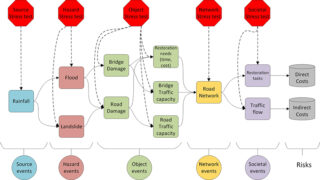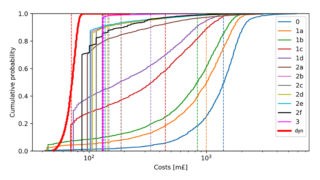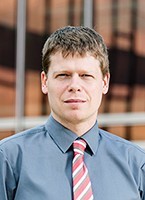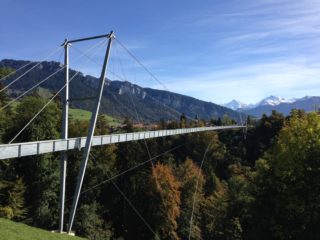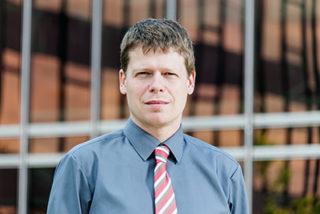Stress Testing Transport Systems
Transportation systems are vital for economic and social development, yet are susceptible to disruptions caused by natural hazards, especially considering the adverse impacts of climate change on increasing the intensity of frequency of climatic hazards. To manage these risks effectively, stress testing, as a diagnostic tool, has shown Mehr
Adaptive Urban Planning for an Uncertain Future: Infrastructure Interventions for the Technological Shift in Transportation
Planning cities to adapt to the future is challenging due to complex interactions between mobility, infrastructure, and land use. This challenge is exacerbated by the need to study future uncertainties such as ever-shifting demographics and industrial landscape, increased environmental and climatic changes, disruptive and unpredictable technological development, and Mehr
E-Bike City: Nur noch die Hälfte der Strassen für die Autos
30. August, 2023, 18:30 – 19:45 | Podiumsdiskussion | Karl der Grosse, Saal, Kirchgasse 14, 8001 Zürich.
E-Bike City Kolloquium
8. Juni 2023, 9:00 – 18:30 | ETH Zürich, Zentrum, Audimax. An diesem Kolloquium werden die sieben Forschungsgruppen des D-BAUG Leuchtturmprojekts «E-Bike City» nicht nur ihre vorläufigen Ergebnisse präsentieren, sondern auch die Teilnehmenden aktiv in die Gestaltung der Forschungsfragen einbeziehen.
Will E-Bikes Bring Amsterdam and Copenhagen to Switzerland?
Kick-off event | 23 November 2022, 13:30, aperitif around 18:00 | HG F 30 (Audi Max), ETH Zürich, Zentrum. Registration deadline 9 November.
Investing in Water Supply Resilience Considering Future Uncertainty and Management Flexibility
The infrastructure required to provide sufficient high quality drinking water to urban areas over long time horizons is highly uncertain. The use of the real options method, which accounts for future uncertainty and considers management flexibility over time, can significantly improve the evaluation of water supply resilience enhancing Mehr
Quantitative Evaluation of Highway Designs Considering Uncertainties in Future Mobility Patterns and Flexibility Using Real Options
Road owners are increasingly being confronted with the need to optimize highway design for an uncertain future. A recent research project at the Infrastructure Management Chair investigated the use of a real options-based method to evaluate alternative highway designs for a fictive case study based on the A15 Mehr
Flexible Office Space for the Age of Distributed Work
The potential large-scale transition from working in the office to working at home, is a massive uncertainty related to the future needs of office space in our cities. It is in the face of this uncertainty, that real estate developers must manage their portfolios. The use of the Mehr
Are Integrated Infrastructure Networks Governable in Contemporary City Regions?
Guest: Prof. Dr. Michael Neuman, Professor of Sustainable Urbanism, Faculty of Architecture and the Built Environment, University of Westminster. The very possibility of governance that is critical — in terms of providing robust human rights, meaningful participative democracy, equitable distribution of wealth, goods and services, and strong environmental Mehr
Future-proofed Urban Areas: Real Options in Urban Planning
The societal needs for infrastructure change drastically over time depending on a large variety of factors, which are very difficult to predict. It is in the face of this massive uncertainty, that urban planners are expected to make infrastructure decisions. To minimize the service risks over time, the Mehr
Bryan Adey zum ordentlichen Professor für Infrastrukturmanagement befördert
Der ETH-Rat hat auf Antrag von ETH-Präsident Lino Guzzella Prof. Dr. Bryan Adey (*1972), zurzeit ausserordentlicher Professor an der ETH Zürich, zum ordentlichen Professor für Infrastrukturmanagement befördert.
To Exploit Big Data for the Management of Infrastructure
The management of infrastructure involves estimating how infrastructure is likely to deteriorate and how demands infrastructure change over time. Increasing amounts of data and increasing modelling capabilities are providing infrastructure managers with improved abilities with which to determine the optimal maintenance and development interventions on infrastructure. Their exploitation Mehr
The Interdisciplinary Nature of Planning Interventions on Network Infrastructure in Urban Areas
Interventions must be executed on infrastructure networks in urban areas to ensure that they provide adequate levels of services. The optimal planning of these interventions requires consideration of the work of many experts to appropriately consider the spatial and temporal aspects of the networks, how the networks might Mehr
Bryan T. Adey, the Professor for Infrastructure Management at the ETH Zürich, Joins the NSL
His research mission is to improve the construction and management of infrastructure with special attention focused on the improvement of decision making from general planning for entire networks to detailed planning for specific projects. This mission is being achieved through teaching the fundamentals of infrastructure management, and pushing Mehr
